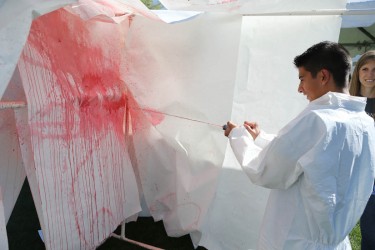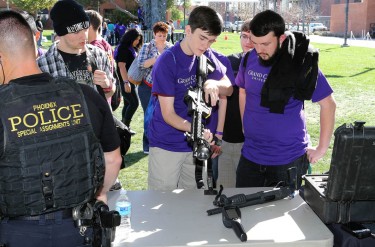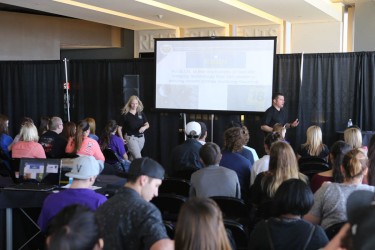Story by Michael Ferraresi
Photos by Darryl Webb
GCU News Bureau
Nearly 1,500 high school students participated in a mock crime scene investigation and other educational events at sites around campus this morning to test their analytical skills during the hands-on, eye-opening Grand Canyon University Forensic Science Day.
For teens who grew up watching popular crime shows like one of the 15 seasons of “CSI,” the event also provided a reality check.
Jobs as crime scene technicians and lab analysts are not glamorous or effortless, experts constantly reminded the students — and in college, the preparation to earn those jobs requires precise, scientific focus shaped by studying biology, chemistry and mathematics.
For many students, having the chance to visit the campus cadaver lab and hear the experiences of police crime lab employees revealed what they might face in the future if they decide to study a science which helps detectives identifying the evidence that is so integral to criminal prosecution.
Evelyn Perez, one of 20 forensic science students graduating from GCU this spring, helped set up the mock crime scene on the Intramural Field. Students worked in teams to judge how to approach the scene — complete with a mannequin victim, drug evidence, weapons, shell casings and blood-spatter on a couch — and collect evidence for processing. Perez cautioned about expecting the immediate results that are portrayed on TV.
“A lot of people think that we have computers that will process evidence and lead us to suspects, but there’s so much more than that,” said Perez, 21, who came to GCU from nearby Alhambra High. She said she plans to pursue a master’s degree in pathology with the hope of working for a medical examiner’s office.
“You’re typically waiting weeks and weeks to process and get results back,” she said.
High school students learn the trade
Brayden Couch, a Red Mountain High School junior, participated in the mock crime scene competition with others in his biotechnology class. He said he’s always wanted to study forensic science, particularly the biological work in the lab, and GCU’s event offered him detailed information about what it takes take to succeed in the field.
“It’s really interesting and it basically solidified my going into the field, seeing it in play like this,” Couch said, adding that he could see himself working as an autopsy tech in the future.
At one of the blood-spatter demonstrations, Adrian Gomez, a junior from Pueblo Magnet High School in Tucson, said he was surprised to learn how hard a stream of blood could shoot from the body. GCU forensic science students pointed out that the heart and arteries can cause a pretty serious spray in some cases.
“I had an idea, but I didn't know it was that strong,” he said. “I figured it might only be a mist or something.”
GCU hosted its first Forensic Science Day in 2012, and the event has since evolved into a more interactive experience, said assistant professor Melissa Beddow. She oversees the forensic science bachelor's program in the College of Science, Engineering and Technology.
Beddow said GCU wants to introduce high school students to what they might experience in college courses and face later in the detail- and deadline-oriented pace of a crime lab or private lab where analysts also collect and catalog DNA.
Since the forensic program is still very new, the University has only graduated about 15 people. GCU alumni who’ve landed jobs in forensic science include Nick Rubino, a forensic biologist in the Phoenix Police Department Crime Lab. Students who visited Rubino’s session today learned about hiring process specifics and how he prepared for a full-time assignment by starting as an intern.
“I think it’s great that they know they could get a job in the crime lab and be working soon after graduation,” Beddow said. “It’s most difficult to get that first job. But once they get that experience, it’s much easier to transfer.”
Beddow said Forensic Science Day provides a nice balance among guest speakers, educational booths, hands-on activities and demonstrations, including one by the Phoenix Police apprehension and drug-detection dogs.
It’s a positive thing that TV has helped expose more American teens to forensic science, she said. However, with the national push toward earlier STEM education to prepare students for scientific fields, Beddow said, it’s important for students to understand they need the “strong foundation in math and science” that police agencies require of their staffs to work in investigations.
Experts share their experience
Guest speakers today included GCU justice studies instructor Kevin Walling, who addressed forensic evidence from the perspective of prosecutors and judges, A.T. Still University’s Dr. Leonard Goldstein, who shared his expertise in forensic dentistry, and several crime lab employees from the Phoenix, Scottsdale and Chandler police departments.
Beddow’s husband, Mike Beddow, of the Phoenix Police Crime Lab, shared his experiences as a ballistics investigator (or "gun scientist," he joked) and the tools used to process evidence from firearms. Other speakers addressed how Phoenix Police logs evidence into the National Integrated Ballistics Identification Network.
The national weapons database, known as NIBIN, includes digital images of spent shell casings and other evidence and enables investigators to identify connections between criminal cases.
Patrick Murphy and Jessica Ellefritz, investigators on the Phoenix Police NIBIN team, said they often rely on volunteers and interns to help log detailed evidence from test-fired weapons into the national database. As they explained, each weapon leaves "fingerprints" that can be identified, logged, traced and used to solve cases.
Murphy said multiple GCU students came up to introduce themselves and say that they were going through background checks to volunteer with the NIBIN team, which networks with agencies around Arizona on active investigations.
“It’s a great forensic science tool to cross boundaries to figure out where a gun has gone and the crimes it may have helped someone commit,” he said.
Reach Michael Ferraresi at 602-639-7030 or [email protected].












































































